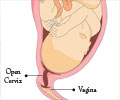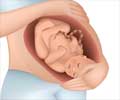A single gene of the mother plays such a crucial role in the development of the placenta that its dysfunction leads to miscarriages.

TOP INSIGHT
Miscarriage occurs only if the pregnant female lacks both parental copies of the Math6 gene.
Transcription factors regulate the expression of downstream genes. Math6 plays a significant role in a number of organs during prenatal development as well as in the adult organism. The knockout mice generated at RUB lack the gene for the transcription factor Math6. "Considering the consequences caused by the lacking gene, conclusions can be drawn regarding its function," explains Beate Brand-Saberi, Head of the Department of Anatomy and Embryology.
She and her team successfully demonstrated that - contrary to previous assumptions - embryonic development is not disrupted when Math6 is switched off. "However, embryos and foetuses die due to placenta problems," says the researcher. The development of the placenta, which is made up from maternal and foetal tissue, is vital for supplying the embryos resp. foetuses with nutrients during pregnancy.
Fewer blood vessels in material portion of the placenta
In a first step, the research team successfully localised the expression of Math6 in the placenta of mice during different stages of gestation and measured its volumes. In the process, it emerged that the gene activity spikes at the beginning of pregnancy.
Genetic makeup of the mother is decisive
"Consequently, the disorder depends on the genetic makeup of the mother, not on that of the embryos," concludes Beate Brand-Saberi. "Math6 expression in the female appears to be essential to sustain pregnancy and supply the foetuses with nutrients. The fact that one single gene of the mother plays such a crucial role for placental development is a very rare, but very important observation," continues the researcher.
Better understanding of miscarriages in humans
The project has laid the foundation for further studies of the placenta. In the future, the researchers intend to analyse the underlying mechanism in-depth, in order to gain a better understanding of complications and of recurrent pregnancy loss in humans.
Source-Eurekalert
 MEDINDIA
MEDINDIA




 Email
Email










